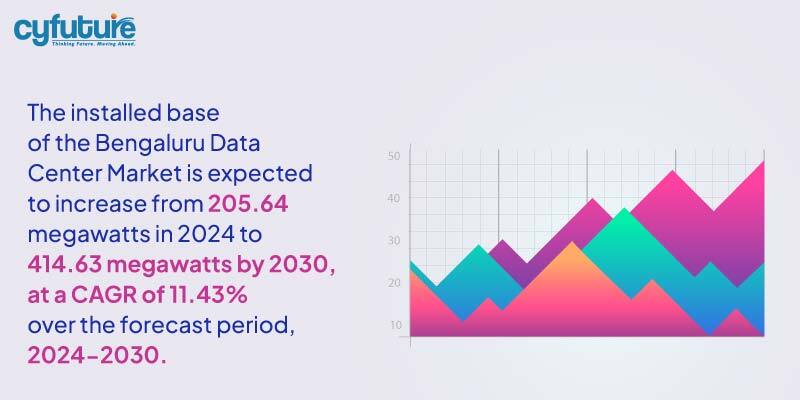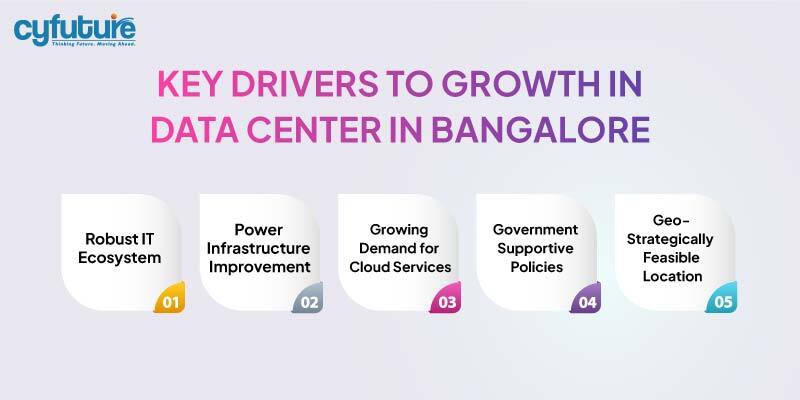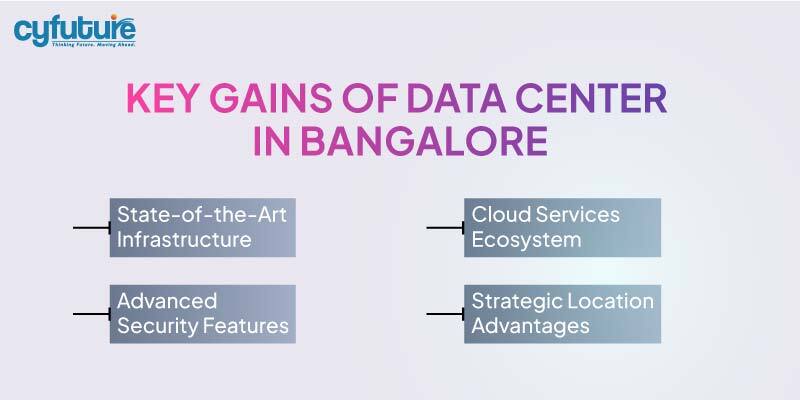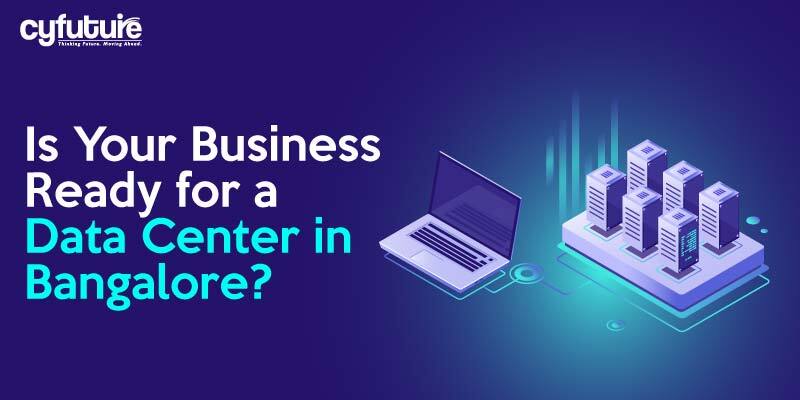 2079 Views
2079 Views
Companies throughout India need help deciding where to store their growing data assets. However, the race to become the nation’s preeminent data center hub has seen Bangalore, dubbed India’s Silicon Valley, with an estimated GDP of more than US$110 billion. It has emerged as a front-runner. For companies seeking to make use of state-of-the-art data centers and cloud services in India, this technical core is a compelling proposition. And, this is because of its strong infrastructure and qualified workforce.
Bangalore offers businesses an unparalleled chance to advance their operations through the combination of world-class data center infrastructure and cloud computing capabilities. But, it’s important to remember that moving to or setting up a presence in a data center in Bangalore is a serious decision. It requires a careful analysis of your company’s current technological standing, upcoming scaling needs, and potential financial effects.
In this comprehensive analysis, we will focus on the many aspects of data centers in Bangalore, such as the mutually beneficial relationship between established colocation providers and the rapidly expanding cloud service industry.
Additionally, we will examine the main factors that attract companies to invest in data centers in Bangalore, the challenges that these companies may face throughout the transition, and the necessary strategic planning to guarantee a smooth implementation.
However, let’s take a look into a few stats and data before delving deep.

- It is currently ranked the 13th largest data center market in the world, with a total of 138 data centers. Furthermore, 45 more data centers are planned to be built by the end of 2025, adding space for a total of 13 million square feet and 1,015 MW of capacity.
- It now has 79 MW installed, 10 MW under construction, and 26 MW in plan in Bangalore. Driving factors include technological proficiency and the availability of a trained workforce in the city, according to the study.
Now, let’s delve into the deep knowledge pool!
Key Drivers of Bangalore’s Data Center Growth

A set of factors has helped Bangalore gain the leading position in the data center market. These are as follows:
Robust IT Ecosystem:
A host of large technology companies, a budding startup culture, and a considerable pool of skilled IT manpower create an organic demand for high-end data center services.
Government Supportive Policies:
The state government of Karnataka has framed policies to attract data center investments to the state, such as tax benefits and smooth regulatory procedures.
Geo-Strategically Feasible Location:
Being located inland, Bangalore has minimal chances of natural calamities; hence, it has been one of the best places for data centers.
Power Infrastructure Improvement:
Large investments in the power sector result in a more reliable electricity supply, a high-priority requirement of the data centers.
Growing Demand for Cloud Services:
Cloud computing has gained much popularity in Indian business, and it has resulted in increasing demands for data center facilities.
The Convergence of Data Centers and Cloud Services
The integration of data center services with cloud services within the Bangalore metro has led to a unique value proposition for enterprises. Traditional colocation services are extended to advanced cloud offering capabilities that enable firms to implement their own choice hybrid and multi-cloud strategies.
This had led to a new generation of data centers which offered the following:
- Seamless integration between on-premise and cloud environments.
- Advanced networking to make distributed cloud architectures seamless.
- Built-in security features at a high level to ensure sensitive data is protected in a multitenant environment.
- Scalable infrastructure to ensure that variable workloads can be accommodated.
The deeper we drill down into the specifics of the Bangalore data center landscape, the more apparent it becomes that not only is Bangalore keeping pace with this evolution at a global level, but it sets new standards of excellence in data center build-out for the region.
Assessing Your Business’s Readiness for a Bangalore Data Center
Technological Readiness
Much before moving to a data center in Bangalore, there is a great need to understand the technological maturity and readiness of your organization for making a transition into the data center. This assessment would be greatly required in certain key areas.
Audit of Present Infrastructure:
- Conduct a comprehensive audit of your present IT infrastructure.
- Identify those legacy systems that are modernization- or migration-intensive.
- Find out how well your current applications are compatible with cloud environments.
Data Management Capabilities:
- Assess current data governance policies and practices.
- Identify the volume, velocity, and variety of data processed by your organization.
- Consider what potential benefits advanced data analytics capabilities provided through Bangalore data centers could provide.
Network Architecture:
- Assess your current network topology against the requirements needed to support distributed computing.
- Consider the need for software-defined networking (SDN) to optimize data center connectivity.
- Assess the need for connections with very low latency to other business hubs in India and around the world.
Security Posture:
- Review the cybersecurity that is currently in place and if it would be adequate for a data center environment.
- Consider the compliance needs of your industry and how those match up with what security the Bangalore data centers have to offer.
- Consider disaster recovery/business continuity plans on any potential move to a data center.
Operational Readiness
This may involve very broad changes to the way your business operates if you are moving to a data center in Bangalore. Some aspects you may want to look at include:
IT Capabilities
- Understand and evaluate the capability and experience of your IT team to manage cloud and data center environments.
- Understand where training will be required to fill knowledge gaps.
- Remember that outsourcing of technology services under managed services is also an option in Bangalore data centers.
Process Alignment:
- Test your current IT processes against what is considered to be the best practice for data center operations.
- You can also consider ITIL or COBIT for an efficient process of IT service management.
- Do change management initiatives you feel are necessary for the smooth change.
Vendor Management:
- Look into the current relationship with your vendors and assess their capability to support your operations in a new environment in a data center.
- You may consider vendor consolidation or partnering with the providers in Bangalore.
- Review the impact on your software license agreements and be compliant in this new environment.
Regulatory Compliance:
- Have an awareness of the regulatory environment which is generally applicable to data centers and cloud services in India.
- Assess how you can meet any data localization requirements and other related regulations.
- Consider cross-border transfers: if you operate an international service, there are implications arising from cross-border transfers.
Financial Readiness
The financial aspect of migration to a data center in Bangalore needs to be carefully analyzed:
Cost-Benefit Analysis:
- Conduct a comprehensive TCO analysis, to compare your current infrastructure cost against the data center’s projected cost.
- Understand immediate migration costs and ongoing long-term operational costs.
- Evaluate the potential ROI from improved performance, scalability, and access to advanced services.
Budgeting and Financial Planning:
- Ascertain your organization’s comfort with initial capital outlay for migration.
- Consider the CapEx to OpEx model shift when moving to cloud-based services.
- Research financing options, including any incentives available by the Karnataka government for data center investments.
Risk Assessment:
- Perform a financial risk assessment of the move, considering currency fluctuations and other regulatory changes that could be in the offing.
- Assess insurance requirements and costs for your assets in a data center.
- Consider the potential for financial penalties due to potential downtime during the migration process.
The critical checking of the above readiness aspects will draw a crystal clear picture of organizational preparedness in using a data center in Bangalore. This will not only help in decision-making but also pinpoint those areas that are to be attended to before embarking on this significant technological shift.
Key Advantage of Data Center in Bangalore

State-of-the-Art Infrastructure
Bangalore’s data centers epitomize the pinnacle of technological advancement in India’s IT infrastructure landscape. They come equipped with:
Cutting-Edge Hardware:
- New generation servers and storage systems.
- HPC Support for high-performance computing workloads.
- Network equipment that enables High-Speed Data transfer.
Redundant Systems:
- N+1 or 2N power redundancy to ensure no Service Disruptions.
- Multiple options for Internet Connectivity with automatic failover.
- Redundant cooling systems ensure ideal Operating Conditions.
Scalable Architecture:
- Modular design: build quickly to match your needs
- High-density computing environments supported
- Flexible colocation options to suit varied business requirements
Advanced Security Features
Security is paramount in Bangalore data centers, with multi-layered approaches taken in the protection of your valuable data assets:
Physical Security:
- On-site security guards 24 x 7.
- Biometric access controls along with CCTV surveillance.
- Man traps and secured loading bays to prevent unauthorized entry.
Cybersecurity:
- Advanced firewalls and intrusion detection/prevention systems.
- Schedules of regular vulnerability assessment and penetration tests.
- DDoS mitigation services for volumetric attacks.
Compliance and Certifications:
- ISO 27001 certification for information security management.
- PCI DSS compliance to handle payment card data.
- SOC 2 Type II attestation assures rigorous operational controls.
Cloud Services Ecosystem
The data centers in Bangalore are way more than physical infrastructure, serving as a doorway toward the rich ecosystem of cloud services that involve:
Hybrid Cloud Capabilities:
- Seamless integration between private and public cloud environments.
- Direct connections to major cloud providers, including AWS, Azure, and Google Cloud.
- Software-defined interconnection for dynamic resource allocation.
Multi-Cloud Management:
- Single-pane-of-glass management of hybrid cloud resources.
- Management tools for workload orchestration.
- Multi-cloud cost optimization services.
Advanced Cloud Services
- AI/ML Platforms, where one can run data analytics in the Cloud.
- IoT Hubs, where sensor data can be ingested, processed, and analyzed.
- Blockchain-as-a-Service, enabling secure distributed ledger applications across the globe.
Strategic Location Advantages
The geographical location of Bangalore has many business advantages:
Connectivity Hub
- Operationally close to submarine cable landing stations for international connectivity.
- Well-connected to major Indian cities through high-speed fiber networks.
- Network of low-latency connections to major Asian business hubs.
Talent Pool:
- Immediate access to a large talent pool of IT professionals.
- Located close to some of the world’s top research institutions, technology innovation hubs, and tech incubators.
- Actively developing an ecosystem for start-ups driving innovation in cloud and data centers.
Business Environment:
- Regional headquarters of many multinational corporations establish strong business linkages.
- Friendly local governmental policies toward the establishment of IT infrastructure.
- Emerging ecosystem of data center service providers and cloud consultants.
Strategic Considerations for Data Center Adoption
For maximum advantages in adopting the said technology in Bangalore, business houses may consider the following strategies to come out with real benefits:
Phased Migration Approach
Assessment and Planning:
- Full inventory of the currently existing IT assets and workloads.
- Detailed migration roadmap to be developed with clear-cut milestones.
- Identification of critical applications and data to prioritize the migration.
Pilot Implementation:
- Start with less critical workloads to test the new environment.
- Use the pilot phase to refine the migration processes that may reveal issues.
- Collect performance metrics to confirm the benefits of the new data center.
Staged Rollout:
- Progressive relocation of workloads based on criticality and interdependence.
- Perform parallel operations during the transition to avoid disruptions.
- Lessons learned in continuous review and making necessary adjustments to the approach to migration.

Hybrid and Multi-Cloud Strategy
Workload Optimization:
- Analysis of workloads and the selection of appropriate environments-on-premises, private cloud, or public cloud
- Provide workload portability to allocate resources in multi-cloud environments dynamically.
- Cloud bursting for handling peak loads also needs to be utilized.
Data Management:
- Hybrid environment-intensive approach to data management.
- Use the data replication and synchronization tools for consistency.
- Good data governance policies to enforce compliance principles across platforms.
Unified Management:
- Use cloud management platforms that provide unified control over heterogeneous environments.
- Automation and orchestration must be implemented to enable efficient resource utilization.
- Develop platform-independent provisioning and management standard processes.
Security and Compliance Strategy
Holistic Security Framework:
- Grant granular access to systems using a zero-trust security model.
- Employ an omnichannel cloud security strategy.
- Conduct periodic security audits and penetration testing.
Compliance Automation:
- Automate compliance monitoring and reporting by using tools.
- Create a compliance dashboard to get end-to-end real-time visibility into compliance posture.
- Design workflows that accelerate response to changing compliance requirements.
Data Privacy Measures:
- Provide strong encryption of data both at rest and in transit.
- Apply data masking and tokenization techniques on sensitive information.
- Control access to data by granting/denying permissions.
Skills and Knowledge Management
Training and Development:
- Invest in comprehensive training for IT staff on new technologies.
- Encourage certifications around cloud computing and data center management.
- Develop a partnership with local educational institutions for talent pipeline development.
Knowledge Transfer:
- Develop mentorship programs where experienced staff is paired with new hires.
- Knowledge base with documented best practices and lessons learned.
- Implant collaborative tools to share knowledge across the organization.
Talent Acquisition:
- Relationship-building with the local tech communities and user groups.
- Offer competitive compensation packages, which might attract the best talent in this fierce talent war.
- Remote work may unleash a more extensive talent pool.
Conclusion!
The adoption of a data center in Bangalore is an inflection point for enterprises and gives them a gamut of opportunities for better performance, scalability, and advanced technology integration. However, this paradigm shift calls for prudent consideration of multifaceted factors related to preparedness on the technological front, operational prowess, and cost considerations.
Bangalore’s emergent leadership as a data center hub, along with its lively IT ecosystem and favorable business climate, forms a compelling value proposition for organizations looking to adopt cutting-edge data center services and cloud computing solutions within India. The best infrastructure, robust security mechanisms and availability of a highly skilled workforce combine for an ideal crucible of digital transformation.
Hence, such a journey is not without its set of challenges. Infrastructural, regulatory, and operational problems are all part of navigating a labyrinthine landscape with strategic acumen on the part of businesses. A piecemeal approach that involves phased migration, hybrid cloud strategies, and proactive talent management would be critical for organizations to fully capitalize on the transformative potential of Bangalore’s data center ecosystem.
Related Posts in This Category



